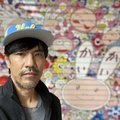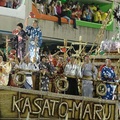Yohei Suzuki is a 30-year old documentary filmmaker based in New York, NY. In 2006, he produced and directed Our Pride: The Spirits of Black Japanese in Georgia, a documentary about families where the father is Black and the mother is Japanese and their children are both. The story touches upon bi-racial identity in a culture that is almost exclusively Black; a perspective that has rarely been touched before.
The documentary has screened at several film festivals including the Asian American International Film Festival 2007, Washington D.C. Urban Film Series 2007 and 2008 Los Angeles Asian Pacific Film Festival. The 30-minute film is now available to view online: Our Pride: The Spirits of Black Japanese in Georgia
INTERVIEW
Where are you from?
I am originally from Japan and came to the United States to attend the graduate program in film at Emerson College.
How did you end up in New York?
After I finished my master's degree from Emerson College, I moved to New York to find a job. I wanted to live in New York because it is the mecca for documentary filmmakers and other media.
Where did you learn how to make documentaries?
I learned documentary filmmaking at Emerson College. When I applied to the school, I was very motivated to learn how to make documentaries to impact society and change people's minds.
The opening scene in Our Pride: The Spirits of Black Japanese in Georgia, where the Japanese mother sings gospel music is pretty amazing. How did you find out that she could sing?
When I met her for the first time in Georgia, I heard from her that she was involved with a local gospel choir at AME church in Georgia. And, to me, her singing negro spiritual in the beginning was very meaningful to introduce the entire story. Her song represents the struggles, resiliency and ethnic prides of Black Japanese people (double minorities).
Where did the idea for your documentary come about?
In 2001, I visited Atlanta for the first time. My ethnicity caused most people to look at me in a different way. Because Black Americans accounted for the majority of the population in Atlanta, some people wondered why I was there since I was Asian. Some people were not friendly to me because of my skin color.
I found that the African Americans in Georgia were not familiar with Asians, and I experienced how difficult it was for Asians to live in African American communities. Some African Americans celebrate Dr. King's birthday and keep many African traditions in their lives, such as African dance, music and costumes. These aspects are not relevant to Asian culture. As a result, it is easy for Asians to feel isolated. I started to recognize the fact that these Atlanta-based African Americans were proud of their ethnicity. They eat soul food, listen to jazz, hip hop, blues, and rap music, and watch a lot of African American movies. They admire African American celebrities, such as John Coltrane, Ray Charles, Denzel Washington, and Michael Jordan. They identify themselves as African Americans. They say, "I'm an African American"; they don't say, "I'm an American." They are proud and celebrate who they are.
Then I decided to do a documentary for my master's project at Emerson College because I thought that documentary must be inspirational to people of different ethnic backgrounds -- even if they were not related to Japanese or Black. I wanted to express how people should be proud of who they are as well as document their social and cultural experiences.
We need to know how to deal with the issues and how to socialize with individuals of other ethnicities. This documentary will uncover the existence of Blackanese and their ethnic pride.
It's hard on film to capture the tastes and smells of food, but one of the things I find fascinating about mixed-culture families is the food. Did you see or try anything interesting in the kitchen or on the dining table?
Of course, I did! Especially I liked the corn bread and sushi.
As evident in your film, children of mixed race are confronted by issues of identity, and in many cases racism, but as adults have overcome and developed a strong sense of self. What factors were key in helping these children cope and deal with the pressure placed on them by society? (parents? school? church? anything...)
I think there will be a lot of factors to help them become aware of who they are. But I think the most significant point was that they were able to accept both their cultural backgrounds. They didn't say they were Black. They didn't say they were Japanese. They said they were Black and Japanese. I think it is very important because it helped them recognize, know, feel and celebrate who they were. And also, it helped their friends in Georgia to get the sense of knowing and getting along with people of different racial and ethnic backgrounds.
Your film is set in Georgia. How important is location in your film? For example, could you have made this film in New York? Would it have had the same impact?
I believe it is relevant to one of my answers above. Doing it in Georgia was important because it was the Afro-centric region.
What are you hoping that people can learn from watching your documentary?
We need to know how to deal with the issues and how to socialize with individuals of other ethnicities. And we need to respect, accept and love each other, no matter what racial group we belong to, because we are hanging in the middle of the blue ball called the earth and we only have each other.
What's your next project? Or what ideas would you like to explore?
I am not sure. I am searching ideas all the time. Once I find something out, I would like to materialize it and impact our society.
Thank you for taking your time to answer my questions!
© 2008 Bobby Okinaka





